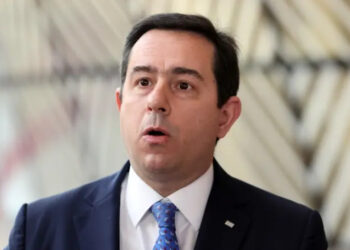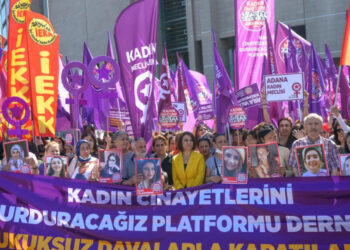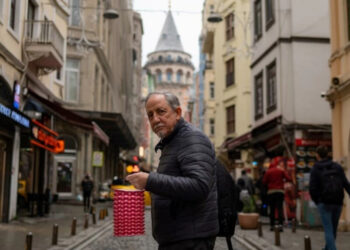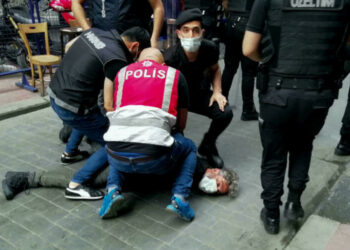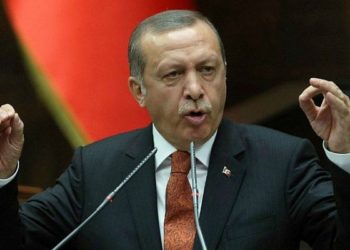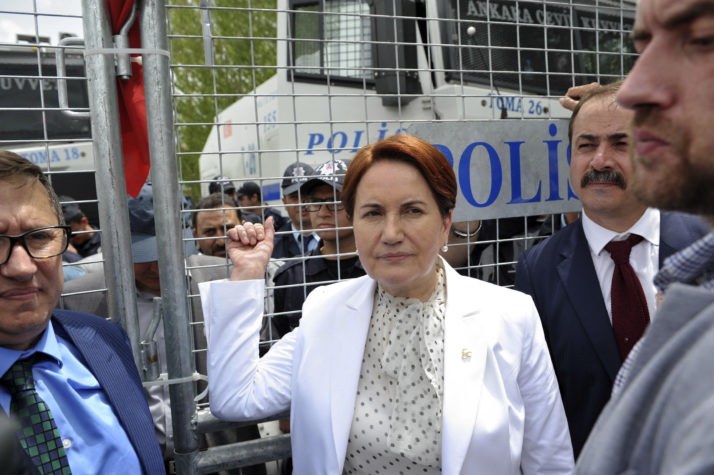There is no shortage of colorful metaphors Turkish president would use to promote his presidential agenda. He even cited Hitler’s Germany to argue that unitary states could be ruled by a presidential system. President Recep Tayyip Erdogan and his lieutenants go in great length to portray the presidential system as the only antidote to Turkey’s political and economic woes.
Mr. Erdogan long argued that the country needs a strongman, with vast powers and authority, as a way to sustain political stability in the country. He claimed that the current system, where the prime minister has an executive power and the president a ceremonial one, creates an awkward, obscure and two-headed system that makes it hard to rule.
“We had governments that ruled this nation for only 26 days,” Mr. Erdogan said in a speech in Istanbul last week, tapping into sentiments of a nation that was fed up with ephemeral governments that led Turkey to an economic meltdown and political turmoil before Mr. Erdogan came to power.
Ülkede savaş varken, başkanlık sistemi için Erdoğan Hitler Almanyası’ndan örnek vermişti https://t.co/3CvhQNFRTG pic.twitter.com/yZHLxtQDFn
— Yarın Haber (@yarinhaber) January 5, 2016
For Mr. Erdogan, the ruler of a nation shall be the one and only one. No king, monarch or queen — no matter how symbolic their powers are — must exist in a political system Mr. Erdogan envisions. He made this perfectly clear in his speech, even casting these ceremonial figures as obstacles to a proper government.
To make a winning argument at the Istanbul conference, he laid out a lengthy and detailed assessment of existing political systems around the world, and underscored how monarchies, kings and queens, are integrated into body politic of many European countries. He did not elaborate on the type of monarchies and their place in a political system in a given country in Europe.
Though parliamentary system is, in theory, the product of the struggle against monarchism and totalitarianism, he argued, in reality it does not always work that way. There are countries, which have republican or democratic outlook, are indeed governed by dictatorship, Mr. Erdogan stressed.
Last week, Turkish Supreme Election Board (YSK) set April 16 as the date of the historic vote, which critics believe will usher in a new political system with placing most of executive powers at the presidential office, consigning the separation of powers into dustbin of history.
The amendment of constitution will enable president to issue decrees, to appoint and dismiss cabinet ministers, vice presidents, to dissolve Parliament and call early elections whenever he deems necessary, to appoint top state officials, intelligence chief and members of key judicial posts. With the new system, Parliament will not be able to oversee or block presidential decisions, there will be no vote of confidence against cabinet members.
For Mr. Erdogan, the presidential system will heal woes attributing to the Turkey’s political system by removing ever-present power struggle between two executive branches, the office of prime minister and the presidency emboldened by revisions in a military-drafted constitution in 1982.
In his speech, the Turkish president dismissed the socio-political analysis that most of monarchies in Europe, or elsewhere in the world, like Japan and Thailand, are purely symbolic, with no real power or relevance for day-to-day politics. (Although in Thailand, the king is revered hugely, and offensive speech against him is punished with a prison sentence).
“If there is an actor in the state system, it never remains symbolic,” Mr. Erdogan said, suggesting that they somehow involve in decision-making mechanism in politics. He presented the presidential system as favorable to other forms of governance, even cast a more democratic fashion related to the proposed bill.
“The essence of the presidential system is that the administration is given to the Turkish people, directly, That’s the truth. The president … has to keep an eye on the pubic because he is responsible to the citizenry at his every step,” the state-run Anadolu news agency quoted Mr. Erdogan as saying.
The defenders of a strong presidency often cite incoherent and constantly changing coalition governments of 1990s when the country plunged into social disarray, financial turmoil and political disorder after endless partisan bickering. The specter of partisan conflict loomed large over every government, doomed their political programs to abject failure in earnest.
But opponents of Mr. Erdogan’s are leery of ominous creeping authoritarianism under a one-man rule, have already unnerved by repressive policies and clampdown on the president’s critics during emergency rule.
Mr. Erdogan’s portrayal of presidency as a departure from past sits well with the depiction of a Manichean worldview between good and evil, glorious history and mediocrity of the moment as Turkey is going through soul-searching for rediscovering its identity. The clash of modernity and tradition writ large in the Turkish authorities’ historical assessment of the unfolding political transformation as they refer to rebuilding the grandeur of the Ottoman past as the ultimate goal to complete the transition to “New Turkey”.
“The issue is not a democracy issue or freedom issue, certainly. The system that we are discussing is the most appropriate solution for Turkey and the Turkish people’s longstanding problems that have been going on for centuries. This is the question,” the Anadolu quoted the president as saying.
The emergency conditions across the country also make a fair and free campaign for everyone a near impossible task. Opposition parties in Parliament lament about Mr. Erdogan’s firm grip over national media, saying that they are deprived of tools to make their voices heard.
Main opposition Republican People’s Party (CHP) leader Kemal Kilicdaroglu said the government media will sure ignore the opposition. Referring to loathsome characterization of No campaigners in government-controlled media, he said they will campaign as if they were running against the state.
President Erdogan’s depiction of naysayers as terrorists presents a formidable challenge for opponents to publicly carry out a No campaign. “Those who are against our flag and who want to divide our country will vote No,” Mr. Erdogan said on Saturday.
In a clear-cut indication of government pressure on media, Kanal D TV channel sacked its experienced anchorman Irfan Degirmenci after he announced on Twitter that he will vote ‘No’ in the looming referendum.
Undaunted by the prospect of arrest, opponents of presidential system are braving myriad of odds and challenges by taking into streets for their ‘No’ campaign with whatever means available to them. On Saturday, five members of civil society group ‘Five June’ were briefly detained while campaigning for No vote. Police released the group members after fined them following interrogation.
The post-coup crackdown on civil society and media devolved into a full-scale clampdown on all sorts of criticism, dissent and led to sweeping purges in epic scale in civil service and academia. The government has shut down more than 150 media outlets, dismissed more than 140,000 public workers, including generals, prosecutors, judges, police officers and teachers. According to Istanbul-based Platform for Independent Journalism (P24), 153 journalists are in prison.
********
This article was possible thanks to your donations. Please keep supporting us here.




